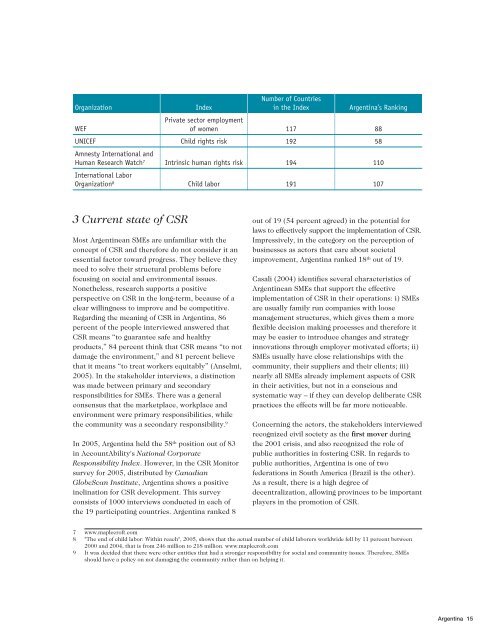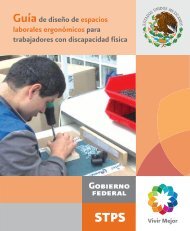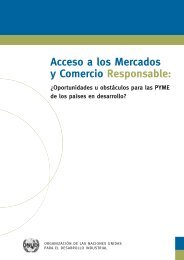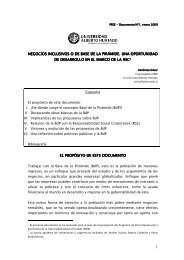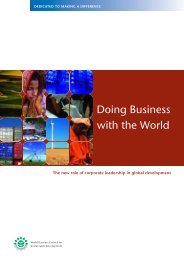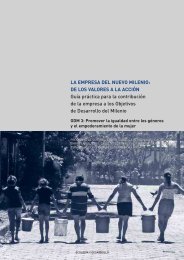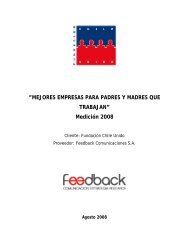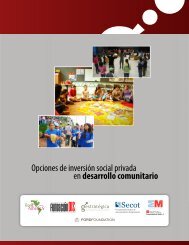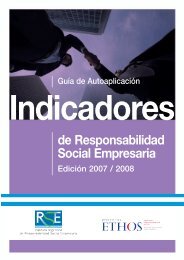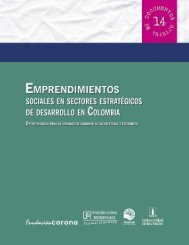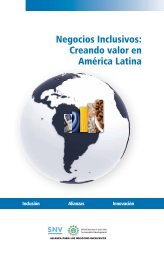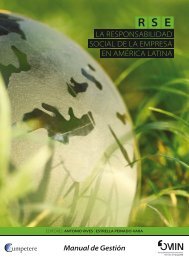Recommended actions to foster the adoption of Corporate Social ...
Recommended actions to foster the adoption of Corporate Social ...
Recommended actions to foster the adoption of Corporate Social ...
You also want an ePaper? Increase the reach of your titles
YUMPU automatically turns print PDFs into web optimized ePapers that Google loves.
OrganizationWEFIndexNumber <strong>of</strong> Countriesin <strong>the</strong> IndexArgentina’s RankingPrivate sec<strong>to</strong>r employmen<strong>to</strong>f women 117 88UNICEF Child rights risk 192 58Amnesty International andHuman Research Watch 7 Intrinsic human rights risk 194 110International LaborOrganization 8 Child labor 191 1073 Current state <strong>of</strong> CSRMost Argentinean SMEs are unfamiliar with <strong>the</strong>concept <strong>of</strong> CSR and <strong>the</strong>refore do not consider it anessential fac<strong>to</strong>r <strong>to</strong>ward progress. They believe <strong>the</strong>yneed <strong>to</strong> solve <strong>the</strong>ir structural problems beforefocusing on social and environmental issues.None<strong>the</strong>less, research supports a positiveperspective on CSR in <strong>the</strong> long-term, because <strong>of</strong> aclear willingness <strong>to</strong> improve and be competitive.Regarding <strong>the</strong> meaning <strong>of</strong> CSR in Argentina, 86percent <strong>of</strong> <strong>the</strong> people interviewed answered thatCSR means “<strong>to</strong> guarantee safe and healthyproducts,” 84 percent think that CSR means “<strong>to</strong> notdamage <strong>the</strong> environment,” and 81 percent believethat it means “<strong>to</strong> treat workers equitably” (Anselmi,2005). In <strong>the</strong> stakeholder interviews, a distinctionwas made between primary and secondaryresponsibilities for SMEs. There was a generalconsensus that <strong>the</strong> marketplace, workplace andenvironment were primary responsibilities, while<strong>the</strong> community was a secondary responsibility. 9In 2005, Argentina held <strong>the</strong> 58 th position out <strong>of</strong> 83in AccountAbility's National <strong>Corporate</strong>Responsibility Index. However, in <strong>the</strong> CSR Moni<strong>to</strong>rsurvey for 2005, distributed by CanadianGlobeScan Institute, Argentina shows a positiveinclination for CSR development. This surveyconsists <strong>of</strong> 1000 interviews conducted in each <strong>of</strong><strong>the</strong> 19 participating countries. Argentina ranked 8out <strong>of</strong> 19 (54 percent agreed) in <strong>the</strong> potential forlaws <strong>to</strong> effectively support <strong>the</strong> implementation <strong>of</strong> CSR.Impressively, in <strong>the</strong> category on <strong>the</strong> perception <strong>of</strong>businesses as ac<strong>to</strong>rs that care about societalimprovement, Argentina ranked 18 th out <strong>of</strong> 19.Casali (2004) identifies several characteristics <strong>of</strong>Argentinean SMEs that support <strong>the</strong> effectiveimplementation <strong>of</strong> CSR in <strong>the</strong>ir operations: i) SMEsare usually family run companies with loosemanagement structures, which gives <strong>the</strong>m a moreflexible decision making processes and <strong>the</strong>refore itmay be easier <strong>to</strong> introduce changes and strategyinnovations through employer motivated efforts; ii)SMEs usually have close relationships with <strong>the</strong>community, <strong>the</strong>ir suppliers and <strong>the</strong>ir clients; iii)nearly all SMEs already implement aspects <strong>of</strong> CSRin <strong>the</strong>ir activities, but not in a conscious andsystematic way – if <strong>the</strong>y can develop deliberate CSRpractices <strong>the</strong> effects will be far more noticeable.Concerning <strong>the</strong> ac<strong>to</strong>rs, <strong>the</strong> stakeholders interviewedrecognized civil society as <strong>the</strong> first mover during<strong>the</strong> 2001 crisis, and also recognized <strong>the</strong> role <strong>of</strong>public authorities in <strong>foster</strong>ing CSR. In regards <strong>to</strong>public authorities, Argentina is one <strong>of</strong> tw<strong>of</strong>ederations in South America (Brazil is <strong>the</strong> o<strong>the</strong>r).As a result, <strong>the</strong>re is a high degree <strong>of</strong>decentralization, allowing provinces <strong>to</strong> be importantplayers in <strong>the</strong> promotion <strong>of</strong> CSR.7 www.maplecr<strong>of</strong>t.com8 "The end <strong>of</strong> child labor: Within reach", 2005, shows that <strong>the</strong> actual number <strong>of</strong> child laborers worldwide fell by 11 percent between2000 and 2004, that is from 246 million <strong>to</strong> 218 million. www.maplecr<strong>of</strong>t.com9 It was decided that <strong>the</strong>re were o<strong>the</strong>r entities that had a stronger responsibility for social and community issues. Therefore, SMEsshould have a policy on not damaging <strong>the</strong> community ra<strong>the</strong>r than on helping it.Argentina15


